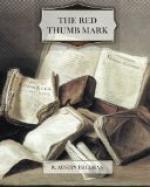Suddenly a new idea struck me. Mrs Hornby had obtained access to this typewriting machine; and if Mrs. Hornby could do so, why not John Hornby? The description would, for the most part, fit the elder man as well as the younger, though I had no evidence of his possessing any special mechanical skill; but my suspicions had already fastened upon him, and I remembered that Thorndyke had by no means rejected my theory which connected him with the crime.
At this point, my reflections were broken in upon by Mrs. Hornby, who grasped my arm and uttered a deep groan. We had reached the corner of the Old Bailey, and before us were the frowning walls of Newgate. Within those walls, I knew—though I did not mention the fact—that Reuben Hornby was confined with the other prisoners who were awaiting their trial; and a glance at the massive masonry, stained to a dingy grey by the grime of the city, put an end to my speculations and brought me back to the drama that was so nearly approaching its climax.
Down the old thoroughfare, crowded with so many memories of hideous tragedy; by the side of the gloomy prison; past the debtors’ door with its forbidding spiked wicket; past the gallows gate with its festoons of fetters; we walked in silence until we reached the entrance to the Sessions House.
Here I was not a little relieved to find Thorndyke on the look-out for us, for Mrs. Hornby, in spite of really heroic efforts to control her emotion, was in a state of impending hysteria, while Juliet, though outwardly calm and composed, showed by the waxen pallor of her cheeks and a certain wildness of her eyes that all her terror was reviving; and I was glad that they were spared the unpleasantness of contact with the policemen who guarded the various entrances.
“We must be brave,” said Thorndyke gently, as he took Mrs. Hornby’s hand, “and show a cheerful face to our friend who has so much to bear and who bears it so patiently. A few more hours, and I hope we shall see restored, not only his liberty, but his honour. Here is Mr. Anstey, who, we trust, will be able to make his innocence apparent.”
Anstey, who, unlike Thorndyke, had already donned his wig and gown, bowed gravely, and, together, we passed through the mean and grimy portals into a dark hall. Policemen in uniform and unmistakable detectives stood about the various entries, and little knots of people, evil-looking and unclean for the most part, lurked in the background or sat on benches and diffused through the stale, musty air that distinctive but indescribable odour that clings to police vans and prison reception rooms; an odour that, in the present case, was pleasantly mingled with the suggestive aroma of disinfectants. Through the unsavoury throng we hurried, and up a staircase to a landing from which several passages diverged. Into one of these passages—a sort of “dark entry,” furnished with a cage-like gate of iron bars—we passed to a black door, on which was painted the inscription, “Old Court. Counsel and clerks.”




